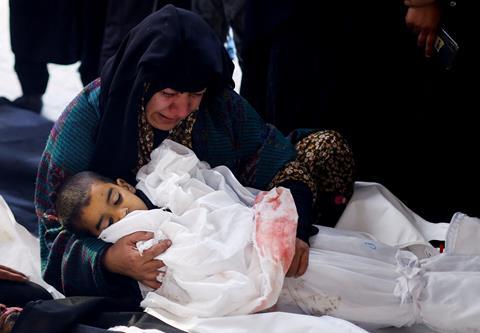Jesus is the prince of peace, yet his followers often struggle to fully embrace pacifism. Michael Coren explores

Has there ever been a less appropriate time to write about the relevance of Christian pacifism?
The horrors of Israel and Gaza, the Russian onslaught in Ukraine, more than a dozen other significant military conflicts, and numerous smaller clashes. War has always been with us of course, but we’ve never had the ability to inflict such slaughter so rapidly and easily. The reality is obscene, the potential even worse.
Therein lies the paradox of the issue. Wars keep occurring not because they are successful but the very opposite. Perhaps the most misplaced statement in the annals of armed conflict is that coined by HG Wells to describe the first world war. “The war that will end war.” Of course, even if wars succeeded in bringing peace and prosperity there would still be a moral argument against them. But they simply don’t.
Very few people regard war as desirable but the majority likely hold, whether they know it or not, something along the lines of the just war theory. The United Nations charter, for example, states, “Only in the inherent right of self-defence against armed attack can a Nation be justified in resorting to military force, without the approval of the Security Council.”
Saint Augustine wrote that war was only morally acceptable if waged to defend the innocent, and today a just war would be based on the principles of right cause, last resort, declared by proper authority, having an appropriate intention, possessing a chance of success, and the use of proportionate means.
The early Church was largely pacifist
The pacifist argument, on the other hand, doesn’t have much support these days, and the political left largely abandoned the idea long ago. When they chant “stop the war” they usually mean stop the war against the people they support. One of the few areas where it does still have some support is within Christianity and even there it’s generally a fringe commitment. The anabaptist tradition is often pacifist, and Quakers too. But for the most part various churches see peace as a vital end rather than a valid means.
Jesus told us to turn the other cheek and love our enemies. He said that peacemakers will be blessed (see Matthew 5). He also told his followers to buy a sword (Luke 22:36), although this may have been metaphorical, and he certainly demonstrated righteous anger when he cleared the Jerusalem temple of merchants and money-changers. But taken as a whole, and certainly compared to his contemporaries, Jesus was indeed “the prince of peace.” (Isaiah 9:6) The early Church was largely, though not unanimously, pacifist, and Christian pacifists won praise and converts during the second world war by serving as medics on the front line. Although there were others – often political rather than religious – who refused even to work on farms because they regarded it as aiding the war effort.
Immutable pacifism is, whatever the motivation, difficult to live. Refusal to resist violence directed at oneself isn’t the same as refusing to intervene when another, innocent and perhaps vulnerable, is attacked. Then again, defending someone against a street thug isn’t the same as launching a missile.
I honour the memory of those who battled Nazism but much of devastated Europe was left in the hands of Soviet tyranny, hundreds of thousands of innocent people died, and the Holocaust certainly wasn’t stopped. Some would even argue that it was made more possible by war conditions and the cloud of secrecy. And that particular war is usually sighted as the case against pacifism.
Korea was five years later, then Vietnam, several wars between India and Pakistan, Israel and its Arab neighbours, wars in Latin America, Indo-china, Africa, the Middle East, and even between Britain and Argentina over the Falkland Islands. That conflict, said Jorge Luis Borges, “was a fight between two bald men over a comb.”
The number of people who have been killed or horribly injured is in the millions, often civilians and even if soldiers frequently conscripted or in the military because of no alternative jobs – which could be provided if investment went into infrastructure rather than armaments.
Beyond the human tragedy is the financial cost. It’s beyond reliable calculation but runs to trillions of pounds, and more than enough to build housing and factories, fund medical systems and schools, feed and clothe people. Which would go a long way to remove the very reasons why wars often start in the first place.
Self-defence? Take Israel’s reaction to the horrific massacre of October 7. Specifics aside, nobody seriously believes that what’s happening in Gaza will lead to long-term peace. Compare this to Northern Ireland, a conflict I reported on and never thought would be resolved. Visceral hatred hasn’t completely disappeared but acting on that disorder is now considered unacceptable on both sides. It was less ideological pacifism than violence fatigue that led to the agreement, often with a strong Christian foundation.
So, no formal ideology but a Christ-centred commitment to an alternative to the status quo that aids only those who deal in arms and power and is always self-perpetuating. If you’re more comfortable let’s call it hatred of war rather than love of peace, war phobia instead of pacifism. Either way, for Christians, for everybody, it’s perhaps, more relevant than ever.





































No comments yet